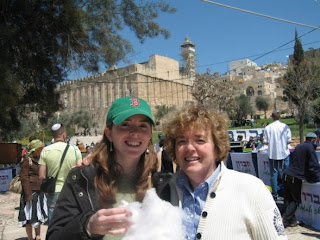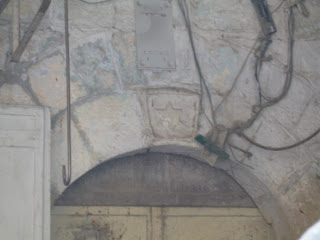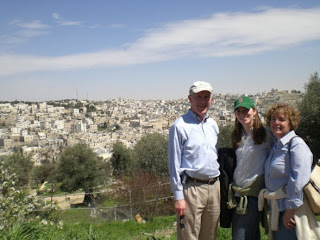My father always seems to have a good hunch with these things, and steered us in the direction of Hebron. While many of my friends, and my secular cousins from Haifa, are amazed (and sometimes horrified) that we so nonchalantly hop in the car and drive to Hebron, these sorts of adventures do not faze me. I have visited Hebron on several occasions, as well as other significant religious and historical cities to the Jewish people, such as Shechem, Elon Moreh and Beit El, with my parents.
When friends and schoolmates question my desire to visit such a "hotbed" of controversy and terrorism and "dangerous" spot such as Hebron, I bristle. A tour guide once told my parents that when asked why the Jewish people don't simply give up Hebron to the Arabs since they are the majority there, she responded to the questioner by saying: "by the same logic, we ought to leave the State of Israel, as we are similarly surrounded by 22 Arab countries (4 on our immediate borders)." If we are willing to give up one of our holiest cities because it is surrounded by Arabs, then perhaps, by the same logic, we ought to eventually give up the small state that is Israel, located amidst 22 Arab countries, many of which call for its demise.
The importance of Hebron was not lost on our first prime minister, David Ben Gurion. In a speech he gave on January 25, 1970, the prime minister outlined the biblical and historical significance of Hebron. In concluding his remarks, Ben Gurion exhorted: "we will make a great and awful mistake if we fail to settle Hebron, neighbor and predecessor of Jerusalem, with a large Jewish settlement, constantly growing and expanding, very soon. This will also be a blessing to the Arab neighbors."
Half a year ago, my parents and I joined a group on an enlightening and meaningful tour of Hebron. We were taken to places in Hebron we had never visited. We saw the ancient Jewish cemetary in Hebron, where the 1929 terror victims, as well as Torah giants are buried, and the Sephardic synagogue in the Avraham Avinu neighborhood, among other sites. Consequently, when we arrived in Hebron this Chol HaMoed Pesach, we expected to enjoy ourselves, but not to see new sites in Hebron.
While enjoying cotton candy and french fries with the Ma'Arat HaMachpeila in the backdrop, we heard an announcement offering a free tour of Hebron. Never ones to miss an opportunity to learn and see more, my parents and I joined the group of about forty Israelis gathering at the entrance to the festival. The group consisted of all stripes of Israeli society-- young and old, Sephardi and Ashkenazi, religious, Charedi and secular.
We were led to a large, locked, steel gate where we had to wait for an Israeli army escort. A platoon of chayalim (Israeli soldiers) promptly arrived and escorted us through the Hebron "kasbah." Once inside the alleyways of an area that is currently off-limits to Jews, we were shown many houses and doorways that once belonged to Jews. Our guide shared many stories about the history of the buildings, the Jews who lived in them, etc. The souk used to bustle with Israeli customers and Israelis whose front doors opened right into the kasbah.
Following our tour of the kasbah and surrounding areas, the guide offered us the opporunity to go to an important Jewish site which is in Palestinian territory. He explained that Jews rarely have the opportunity to go to this site, the tomb of Otniel ben Kenaz. Otniel ben Kenaz was the first shofet (judge) in biblical Israel, as well as Calev ben Yefuneh's brother(one of the "good" spies). In the Talmud, Temurah 16a, we are told that upon Moshe's death, 300 laws were forgotten. These laws were restored only due to the erudition of Otniel ben Kenaz. We jumped at the chance to visit his tomb.
In order to reach his tomb, we had to cross through an Israeli army checkpoint. While our group, now down to about 20 people, reached the checkpoint, we stood in one line and noticed three Arabs in the line next to us. One was an older man, one was a pregnant woman, accompanied by her friend. While we were waiting to cross the checkpoint, we noticed that two Israeli guys in their early twenties began filming us and the events that were unfolding. The Israeli army was poised to let us enter the checkpoint first, and to the cameramen this was reprehensible. A third Israeli guy spontaneously appeared and challenged the young Israeli army officer: "Why should these Arabs have to wait while those Israelis get to go in?" Without missing a beat, the Israeli soldier whipped back: "Why should these Israelis be barred from entering and visiting this site every day of the year when these Arabs can enter at any time?" My Mother, realizing that the entire episode was a set-up, turned to the camera men and said: "Where are you and your cameras when Arabs kill innocent Israelis?" After seeing my mother's courage, our fellow Israelis, who were part of our group, exchanged words with the cameramen and their friends who work for various NGO's.
Shortly thereafter, we crossed the checkpoint. Once on the Palestinian-controlled side of Hebron, we were followed by a flurry of cameramen and European NGO representatives. I felt like Lindsay Lohan walking down Rodeo Drive. The tomb was a three minute walk from the checkpoint. The chayalim closed down the road for us to visit the tomb for about ten minutes. And yet, our visit seemed to engender a reaction apropos an international crisis.
We visisted the tomb, led by a local Hebron resident, who told us that the tomb had not been open to Jews in several years. We felt very lucky to have had the opportunity to visit the site. Upon emerging from the tomb, we were surrounded by a swarm of Arab and international cameramen, reporters and NGO representatives. My father aptly referred to this group as the "useful idiots," borrowing the term from the sixties, when it was used to describe Soviet sympathizers in the West.
We crossed the checkpoint and returned to the Israeli-controlled part of Hebron. My parents and I returned to the site of the festival and went to pray in the Cave of the Patriarchs. Passover is one of the few times when all of the halls in the Cave are open to Jews.
Driving back to Jerusalem, we reflected on our extraordinary day in Hebron. We saw parts of Hebron once populated by, and now off-limits to, Jews. We learned about the Jewish community that was. We visited the tomb of one of the great shoftim. We saw first-hand the way the media manipulates and exaggerates seemingly innocuous episodes into explosive affairs.
As I closed my eyes and drifted into sleep, I felt grateful that my Dad had steered us to Hebron...

(Becky and Mom eating cotton candy in front of the Cave)

(Jewish star above a home formerly owned by Jews in the Hebron kasbah)

